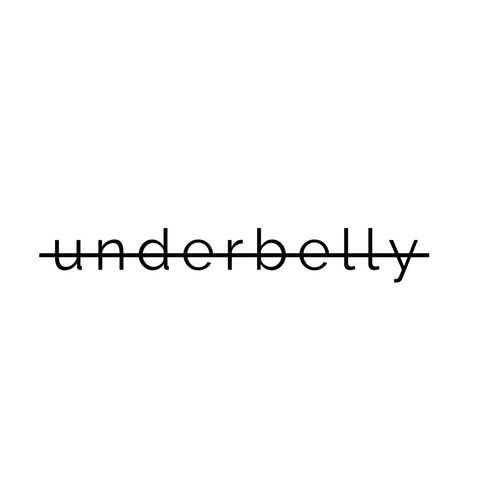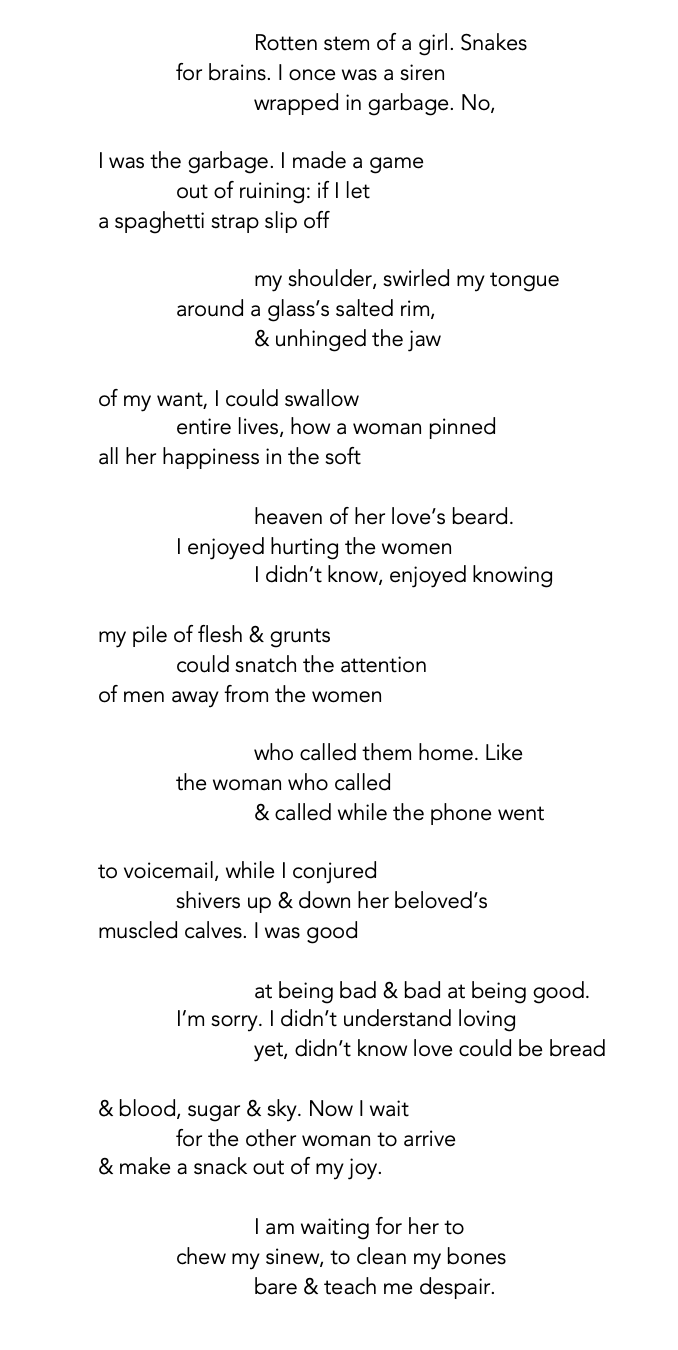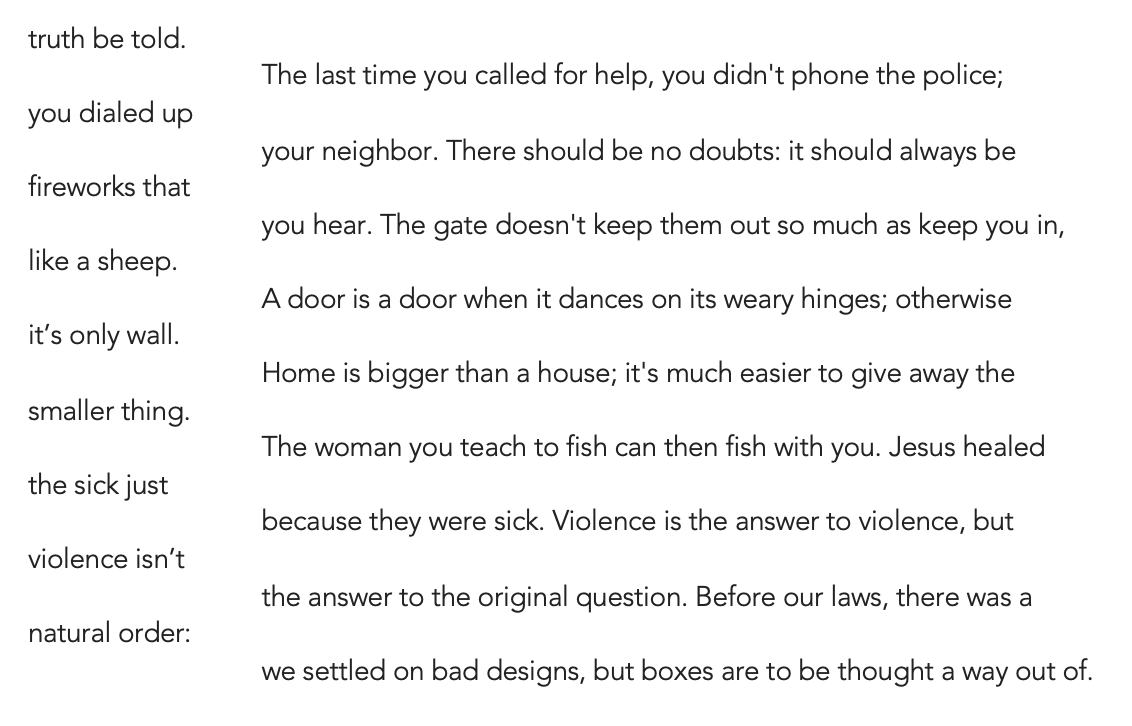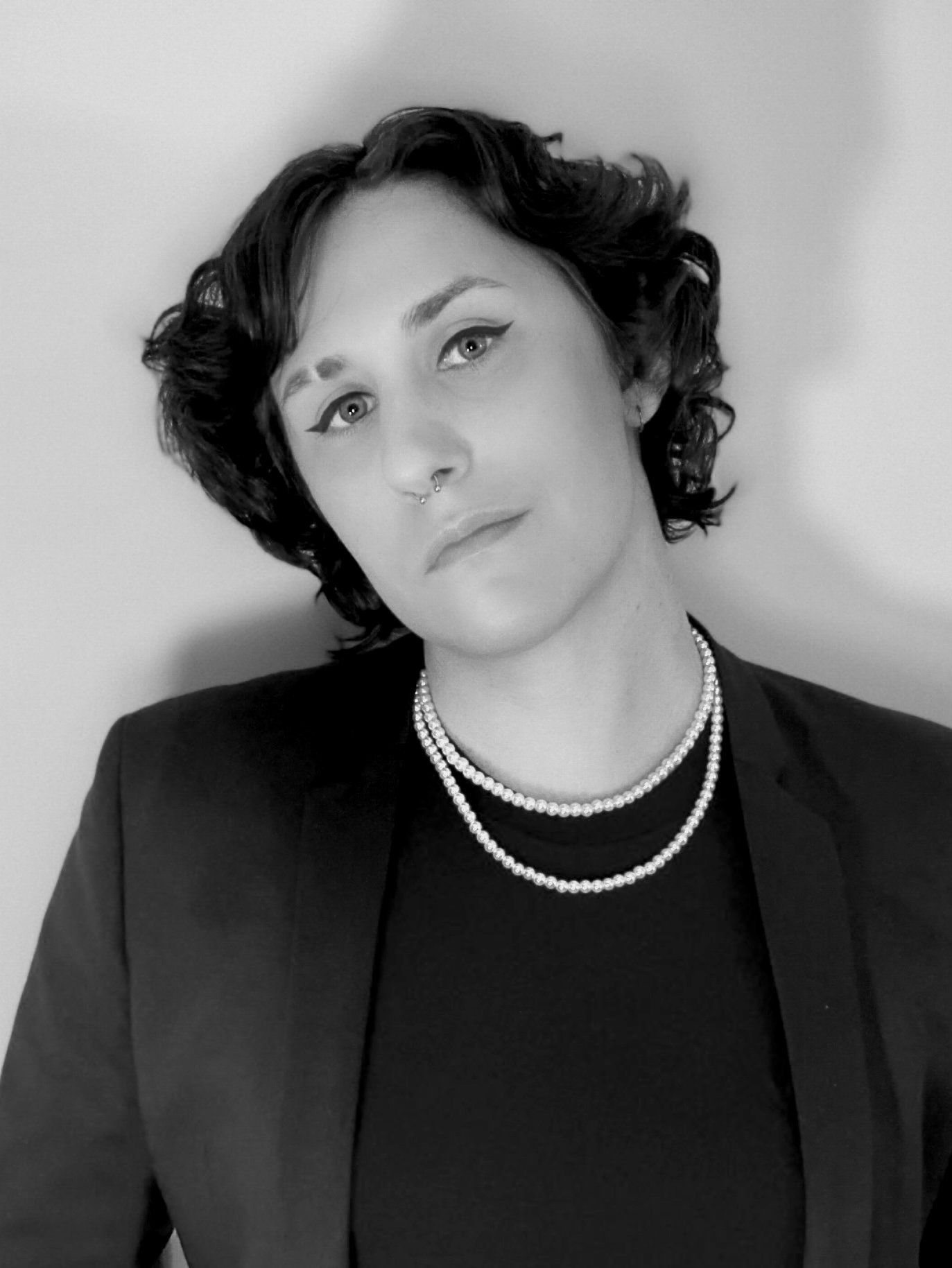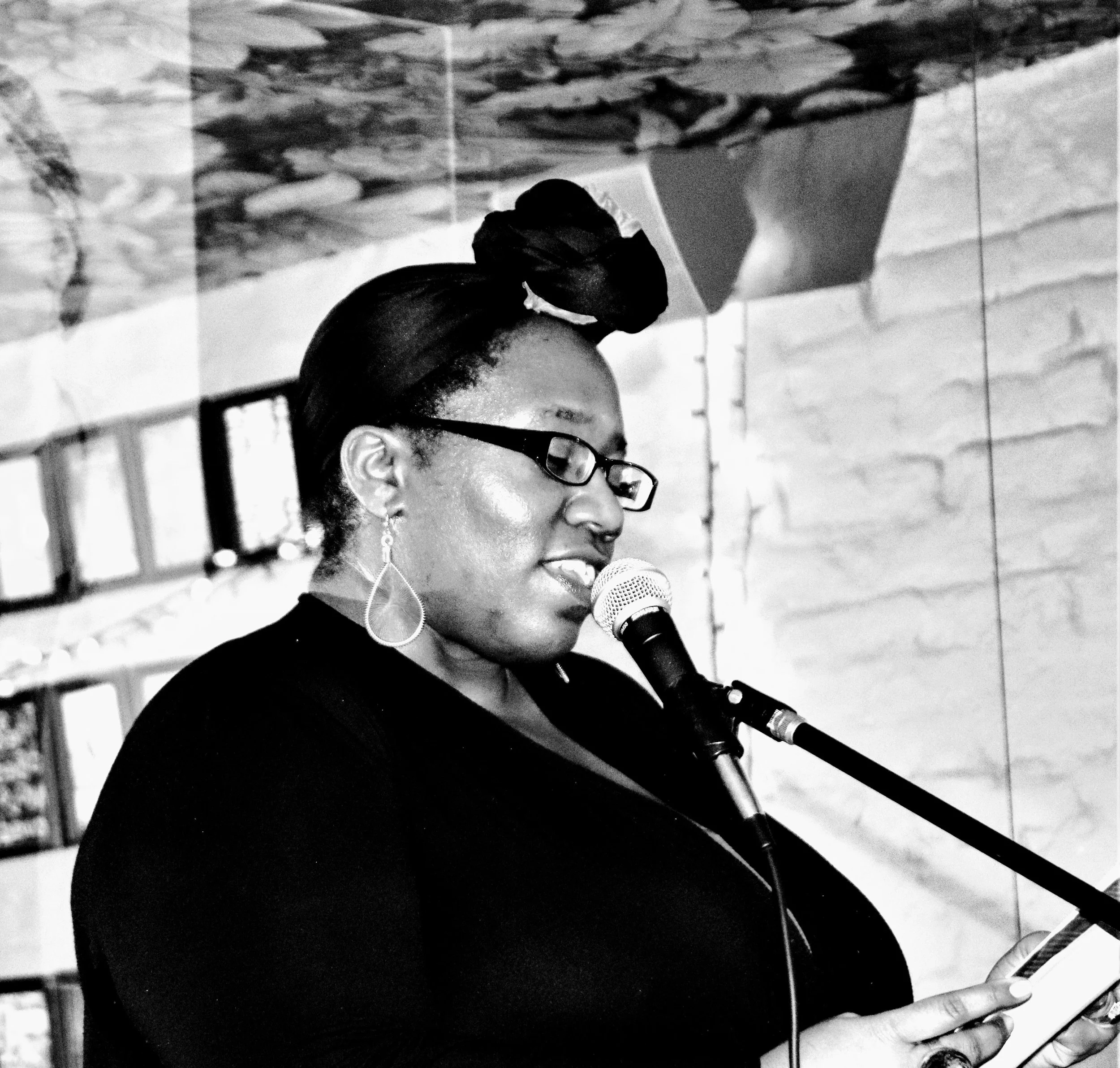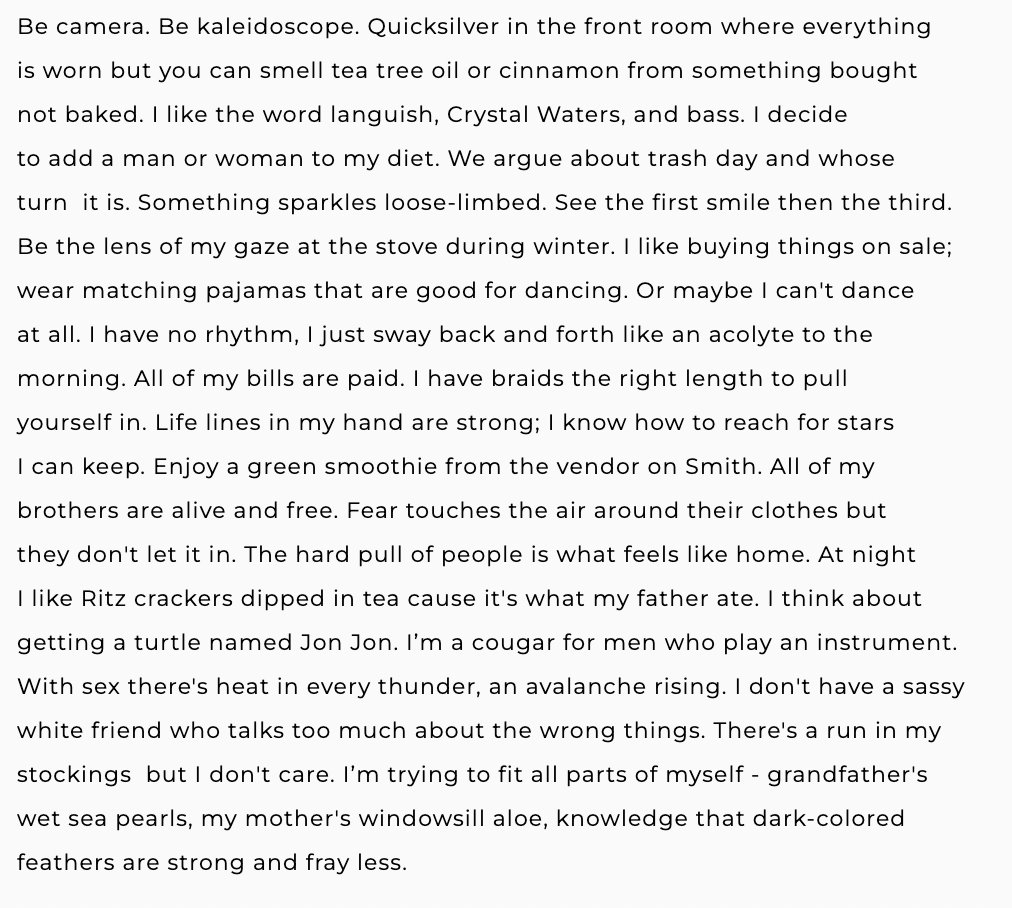Stevie Edwards
Lately, my poems often interrogate what it means to be a wife, while also being a feminist, childless, and bisexual woman. While I don’t tidily fit into historical notions of what a wife is, at the core of my marriage is what I see as unshakable fidelity and devotion. When I started to write “The Other Woman,” I wanted to address a former version of myself that I now recognize as deeply selfish and troubled. Having been in a positive and rewarding relationship for over six years, it’s hard for me to understand why I thought it was acceptable and even titillating to be the other woman.
The first draft became clichéd with the lines, “Like it was possible to win at breaking /someone else’s heart,” which I have cut. I also saw a disconnect between the “Sorry” anaphora section and the rest of the poem. Furthermore, I didn’t think that the apology seemed genuine yet. My revisions for the second draft focused on the last third of the poem. The line “I didn’t understand loving yet” kept popping into my head; I truly believe that loving has revised me. I also realized that a part of me is haunted by guilt and keeps “waiting / for the other woman to arrive” because I believe I deserve it.
In my final revision, I felt that both the form was not working and that my ending did not sound right musically. Tercets with shorter lines provided me with the most satisfying line breaks, and the increased white space allowed the lines to breathe more. One night, around midnight the line “I am waiting for her to clean my bones with despair” came to me as I was nodding off, and I knew I needed to incorporate it into my final draft.
< DRAFT 1 >
The Other Woman
Rotten stem of a girl. Snakes for brains. I once was
a siren wrapped in garbage. No, I was the garbage.
I made a game out of ruining: if I spread my stink enough,
let a spaghetti strap slip off my shoulder,
licked my lips and opened my eyes wide and hungry—
I could have anyone I didn’t want. And I did
with no remorse. I enjoyed hurting the women
I didn’t know, enjoyed knowing my pile of flesh
and grunts could snatch the attention of men
away from the women who called them
home. Like it was possible to win at breaking
someone else’s heart. Sorry I was on fire.
Sorry I was fire. Sorry I couldn’t keep my loneliness
to myself. Sorry my loneliness sang the worst songs
off key. Sorry I seduced the key to someone else’s
happiness into my pocket, crusted in lint and crumbs.
< REVISION >
The Other Woman
Rotten stem of a girl. Snakes for brains. I once was
a siren wrapped in garbage. No, I was the garbage.
I made a game out of ruining: if I spread my stink enough,
let a spaghetti strap slip off my shoulder,
licked my lips & opened my eyes wide & hungry—
I could have anyone I didn’t want. & I did
with no remorse. I enjoyed hurting the women
I didn’t know, enjoyed knowing my pile of flesh
& grunts could snatch the attention of men
away from the women who called them
home. Like the woman who called & called
while the phone went to voicemail,
while I conjured shivers up & down her
beloved’s calves. I was good at being bad
& bad at being good. I’m sorry. I didn’t understand
loving yet, didn’t know how love was bread
& bone, sugar & sky. Now I keep waiting
for the other woman to arrive & devour
all the hours in which I have held him. I am waiting for her
to make a snack out of the religion
I have built of kissing his forehead, to smack
her lips & savor each morsel of my devotion.
< final version >
THE OTHER WOMAN
Cortney Lamar Charleston
Prior to writing the first draft, I had been trying to wrap my mind around the essentiality of imagination in resistance and revolution. When we live under violent, oppressive systems, one of the principal goals of their design is to make it impossible for us to believe anything other can exist or function in their place: we are actively stripped of imagination to advantage those at the top of the proverbial pyramid (hence “a lack of imagination will kill you”). In playing with this idea, I thought back to my college days, where one of my professors had built his class around the idea that creativity (imagination by another name) emerges underneath constraint. I liked that concept because it suggests that the solution is a matter of reversal rather than a need to bring something original into being. That’s vital, valuable given the suppression of imagination for longer than any of us have been living.
I’m unsure how long this poem was living inside me before I got it out. Looking at time stamps on my computer, it was November 19, 2020, thirteen days after Biden had been declared president-elect, which offered many, if only briefly, a chance to finally catch their breath. After all, we’d been trying to survive COVID-19 since February, and hundreds of thousands of us, at that point, had not. The world had watched George Floyd’s murder and taken to the streets despite the risks to health and body. Folks were furloughed or laid off as businesses and public life shuttered. This poem was birthed, then, by dread. It poured out of me, in its first version, like cheap boxed wine.
Drafting this poem mirrored my typical process: I allowed the language to flow mostly without interruption, with no concern for lineation, barely even a thought to punctuation. I let the words coalesce as they arrived and then I “shaped” the poem later, like clay. A title is an entryway into the poem for a reader, but a title is often the entryway into writing for me, as was the case in this instance, introducing tension from the beginning that the lines to follow unravel.
Once I placed the last period, I realized the text was too rigid and came too close to making a limiting mistake (in my opinion) for a poem: that it operates as the answer rather than the question. Stated differently, it stifled room for the kind of thinking it wants to invite. It was heavy when it needed to be light.
How to get there was unclear to me for some time. I had at least one other draft between these two that was entirely new language, but still suffered the same initial issue. But after a clean separation, I returned to the idea of reversal and revisited the original draft, which did have moments of cleverness or insight; I took several of those moments and challenged myself to think of a way to flip the convention it references, what our systems would program us to lean into as impulse. Isolating them in this exercise was the breakthrough I needed. It made image more of a focus, simplified the language, and squeezed the lines. It opened space. Perhaps most importantly, it led me to strip “you” from the title—which encouraged, however subtly, an individualist focus oppositional to the questions around concern, care, and collective in the spaces between the lines.
I don’t know if this is the “final” version; I just know that it’s brought me further along a necessary journey. For that, I’m grateful and content.
< draft >
IT'S IMPORTANT I REMEMBER THAT A LACK OF IMAGINATION WILL KILL YOU―
I mean, it's obvious they were boxing us in from the beginning,
asked us what we wanted to become one day―
besides ball players―and we boys said firefighter or police officer,
our menu impoverished, though it's worth noting none of us
grew up to say fuck the fire department.
The girls had a better grasp of things but
they were girls, so nobody seemed to care all that much.
The world as introduced to us was small, small-minded
and stubborn, and it remains that way:
we build everything against malleability.
But, ironically, conservatism doesn't give way to conservationism.
Incremental change means the bullet missed my head by inches
instead of taking me out like it did that man with all the dreams.
The point of it all is to make you expend your energy
on understanding things as they operate instead of asking how
they can operate differently: it was the latter that allowed
Daniel Hale Williams to perform the first open-heart surgery.
The issue is that nobody has the time to study
health insurance policies except the people making a profit
off of them, people who don't actually have hearts.
All that time it would take I put into my paycheck instead.
My boss, who is your boss, who is every boss, tells me
to think outside the box whenever something goes off the rails.
The box is singular so we're all inside it at the same time,
thus the expression life is a gift. With Amazon Prime,
all my packages arrive within two days of placing the order
and I think of that as a gift, too.
I believe it's called compartmentalization when you put a box
inside another box. We put God in the box of a church,
put home in the box of a house, put knowledge in the box of a school.
I learned to think in a box and I am not alone in this experience.
Once, one of my professors told me that creativity was being
able to solve a problem within a certain set of constraints:
it was a marketing class but it made a valid point.
We have a two-party system and a whole lot of problems here:
solve for x or put x's in your eyes. If it's not one thing that gets you,
it will be another until, that is, we manifest a destiny where
our words rise to their definitions like snow-white avians.
< REVISION >
It’s Important I Remember That a Lack of Imagination Kills—
torrin a. greathouse
My process of both writing and revision are often driven primarily by experimentation and play. By rendering a poem—particularly one that is rhetorically or emotionally difficult—down to its mechanical elements I gain the ability to see the text anew, to approach it without the same preciousness I otherwise might. In the case of this particular poem, the process of play in the initial composition and first revision was facilitated by a prompt given to me by my graduate advisor, Douglas Kearney:
1) Please write a poem draft, relatively quickly. Maybe go for 12 lines total?
2) Review the draft, please. And every place you find a verb, interrupt the poem with an inquiry about the written action. The interruption/inquiry may last 2–12 lines but must return to the poem at the point of interruption.
3) Please continue this process until all of the verbs in the original draft have been interrupted and questioned.
For the first draft, the constraint of approximately 12 lines led me toward the sonnet form. However, in as many ways as the initial draft was aided by this container, it also served as a limiting factor for the poem’s rhetoric, particularly as I tried to cleave to a loose iambic pentameter. The second phase of this prompt forced a kind of formal interrogation of craft decisions that soon began to verge toward antagonism. Though, as I returned to this version of the poem, I found that I loved a lot of the language this unusual craft engagement had generated. In the final draft, I began by highlighting the most compelling pieces of language in each version, then attempting to place these into conversation, forming a central rhetorical thrust.
< draft 1 >
Unholy Sonnet for the Welt & the Flog
“Pain blesses the body back to its sinner” — Ocean Vuong
Handcuffs around my wrists lined with synthetic
fur. Arms—hoisted heavenward. Clothes—scattered
like flower petals lanced by hail. Piano
strings, when struck, vibrate long after we can no
longer witness their dance. The body—just
a music box with bones. The blood—a note
that when plucked blues. My muscles sing an ugly
melody. All of my bones refuse to harm
-onize. Percussion is our oldest form
of song, slipped disk or tongue’s distance from psalm.
I beg to be beaten into any-
thing more beautiful than gospel choir’s howl.
There is no prayer to save me from my flesh.
You can’t have the bible without the belt.
< draft 2 >
For the Welt & the Flog
“Pain blesses the body back to its sinner” — Ocean Vuong
Handcuffs around my wrists lined
for comfort—though perhaps not
mine but the one who bound me—
with synthetic fur. Arms, hoisted
(As one might raise a raft’s mast?
Or as a corpse lifted into the air
a kind of flag? For what purpose
do the hands move?)
heavenward. Clothes—scattered
(Could any other word fit?
Any vocabulary
but that of aftermath
describe the falling)
like flower petals lanced—
the way motion stretches
objects in the eye, drop of rain
a needle, a blade—
by hail. Piano
strings, when struck,
(No music without
violence or wind)
vibrate
like muscle strands, weary
with the work of composing
each limb,
long after we can no
longer witness
(the crime
of their failing)
their dance. The body—just
a music box with bones. The blood—a note
that when plucked
(more like a guitar strings
or fruit, sweet & heavy
on its vine?)
blues—
the air bruised
dusk-dark by its sound.
My muscles sing
(soundlessly as gunshots
through water, or whale
song in sky—
the convenient metaphor)
an ugly
melody. All of my bones refuse
(the careful doubled
meaning, a word
& its shadow)
to harm
-onize.
The line break here, a welt
between breaths. A word
broken to reveal the violence
its simplicity contains.
Percussion is our oldest form
of song, slipped disk or tongue’s distance from psalm.
I beg
(entreat, implore,
or perhaps to pray
is a better synonym)
to be beaten—
& how convenient this word,
beat, that lives in both
the kingdoms of brutality & song
—into any-
thing more beautiful than gospel choir’s howl.
Music of the human
animal, the way that praise unhinges
melodies from the oppressive
mathematics of sound.
The singer’s voice, a cry
or moan tuned to the key of holy.
Despite this,
There is no prayer
(in speech
or song)
to save—
to pull, as in rapture
or a needle passing
through cloth—
me from my flesh.
You can’t have the bible without the belt.
< final draft >
Belt is Just Another Verb for SonG
“Pain blesses the body back to its sinner” — Ocean Vuong
Handcuffs around my wrists
lined with synthetic fur, my arms bound
& hoisted, heavenward, as if in praise.
Once, bodies like mine were seen as a symptom
of sin, something to be prayed away;
how once, priests beat themselves to sanctify
the flesh. To put their sins to death. Now,
my clothes scatter across the floor like petals
lanced by hail. Motion stretches objects
in the eye. A drop of rain remade,
a needle, a blade. Mark how muscle fiber
& piano strings both, when struck, ring.
No music without violence or wind.
I’ve been searching the backs of lover’s hands
for a kinder score, a pain that makes
my pain a stranger tune. Still, my body aches
an ugly psalm. All my bones refuse to harm
-onize. Percussion is our oldest form of song,
wind bruised into melody. Let me say this plainly:
I want you to beat me
into a pain that’s unfamiliar. How convenient
this word, beat, that lives in both the kingdoms
of brutality & song. The singer’s voice: a cry,
a moan, god’s name broken across a blade
of teeth. The riding crop & flog & scourge—
a wicked faith. A blood-loud devotion.
There is no prayer to save me from my flesh.
You can’t have the bible without the belt.
Cynthia Manick
In 2017 I watched a slew of movies where Black women played the sidekick. They made quips, they were about to get evicted, they had 5 kids, or they were always mentally running. It bothered me, that Black women were never shown happy, in love, or even “in-like” with themselves. I wrote the original poem out of frustration with the lines “Be camera. Be kaleidoscopes” — two glass apparatus that both capture, steal, reflect and change how you see and how you are seen.
While the first three lines remained in revision, the poem become long and intimate. I call it “wide-hipped,” as it spreads on the page as if the lists of what the speaker can be, is never-ending. The original poem had an element of distance because the speaker was an omnipotent “she.” This turned into an “I” which fostered an ownership of the narrative and connection to the reader, as they are taken through a poem of contrasts. A Black woman can be a cougar, love house music, be introspective, and change lovers on whim of she chooses. I also wanted to change things that pulled people out of the poem – “tenderoni” invoked Bobby Brown; music implied dancing and the stereotype that all Black people can dance; “Sunday night sermon” was rooted in the Black church and the assumption that we all go. The poem was also enhanced by the changing times with “all of her brothers are alive and free. Fear touches the air around their clothes” as Black life increasingly became concerned with survival.
As I revised, the poem evolved from being about Black women in love, to Black Love in general and the ability to see the Black “I” in all its complexities – from eating Ritz crackers to the quest to find oneself.
< draft >
i want to see black women in love on television
Be camera. Be kaleidoscopes. Quicksilver
in the front room where everything is worn
but you can smell coconut oil or lavender.
See the first smile then the third. Be the first
love then the second. Be the lens of her gaze
at the stove on a windy morning. Be cougar
or tenderoni. Have African brains the right
length to pull yourself in. Or see hair down
to the thighs bought and paid for. Be crystal
waters and bass. The run in a black stocking
and not care. Be pills paid with a shake of
the head. Coltrane at the root of a Sunday
night sermon. Have them realize theirs
medicine in the words and hand. Heat
in every thunder.
< REVISION >
i want to see black love on television
Ruben Quesada
My poetry revision process is a long and intricate one, sometimes taking years to complete a single poem. An example of this process is my poem "1985," which underwent significant changes to arrive at its final form. Originally, "1985" was two separate poems titled "III" and "IV" that I later combined into a single poem. Both poems explored sound and rhythm, written in tightly justified blocks of text without any punctuation. This style invites readers to experiment with phrasing and tonality, resulting in a dynamic reading experience that emphasizes the musicality of the language.
In "IV," only proper nouns are capitalized to mirror natural speech, with the most meaningful word emphasized. This poem focuses on the story of Rock Hudson and his relationship to Ronald Reagan's inaction towards the HIV/AIDS epidemic during the 1980s. Hudson's status as a closeted gay man in Hollywood during the 1960s and 1970s affected both his personal and public life, which I highlight in the poem.
The radio announces
Rock Hudson has died
There is no funeral
Only a body
The color of ash
The final poem, "1985," is quite different from its predecessors and explores art, media, and cultural literacy. I spent over four years revising it, and it evolved into a 27-line poem. The poem is a series of images forming a moment, like a film reel, and offers a unique perspective on the 1980s. The ending contrasts Hudson's quiet passing with the public death of my classmate in a hit-and-run accident, drawing attention to the societal pressures and discrimination faced by the LGBTQ+ community in the past.
My creative process is not complete without revision. It empowers me to consider the subtleties of meaning, sound, and language. This process is evident in my poem "1985." I'm also interested in understanding how this revised work will stand out in the current cultural climate. The poem offers a distinctive viewpoint on the 1980s.
< early draft >
iii
< FINAL draft >
1985
I stand on our lawn
A girl passes
Like a vanishing shadow
I watch her wait
At the corner crosswalk
As birds dart into trees
My eyes blur
A car begins to slip
Across the horizon
Her body flails
Toward the curb
My mother appears
In the crowd
We stand tightly tucked
It’s Mary in a dress
the color of asphalt
She is the color of skim milk
Months later
Mary’s mother is found
In the garage
With the car running
Before we attend her funeral
The radio announces
Rock Hudson has died
There is no funeral
Only a body
The color of ash
